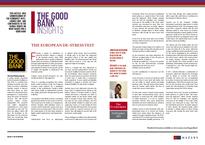The European de-stress test
"This has led governments to bail-out banks, and regulators to insist on ever greater stocks of capital and liquidity to shock-proof the financial system.
Europe’s weak growth prospects are now testing the limits to this approach. There is a growing recognition that unless banks extend sufficient credit, the European economy could stagnate for a prolonged period. In this environment, Europe’s banks will remain fragile as impairments increase and capital generation through profit growth is limited.
Low growth is also likely to mean a sustained period of low interest rates in most of the EU. This is bad news for banks as it compresses interest margins, their principal source of revenue. And if a bank tries to pass on its own interest costs to its borrowers, this can affect the credit quality of its loan book, leading to higher capital requirements and impairment charges.
Policymakers now have an opportunity to address these issues, and in particular to decide what to do about the suggested procyclical effects of the new capital and liquidity rules. The announcement that Basel rules will be eased is a first sign that the approach might be changing.
There is a danger that this adjustment is too slow, and that policymakers remain too focused on stability in the here and now. Given the uncertainties about Europe’s economy, there are good reasons to preserve the Basel III status quo. It would take a courageous bank supervisor to ease capital and liquidity standards in support of growth and future bank profitability. Yet this needs to happen.
Another issue to be addressed concerns the large stock of impaired loans sitting on the balance sheets of Europe’s banks. In Spain, Ireland and Greece, a decision was taken to capitalise banks for the losses which could arise if enough of these loans default. This has been its own costly orthodoxy. The ECB will need decide whether to adopt the same aggressive stance, or to give banks the time to work through their loan books. This second option works in a growth scenario, but it is unclear this will happen if growth fails to lift borrowers’ credit quality.
These challenges are likely to be debated hotly as the next EU-wide stress test is constructed.Previously, these tests focused on individual bank solvency at a point in time. This crude, pass-fail approach, which Europe adopted from US and UK examples, was arguably necessary in the middle of the crisis, when survival was measured in days. Now that the immediate pressures on banks appears to have abated, the question being asked is whether a simple repeat of these testing measures will actually do more harm than good.
In fact, it is far from clear what a test of bank solvency will reveal that is not already known, or at least suspected. The question facing Europe is not which of its banks are weak: it is how this situation can be changed and how it will be paid for.
As the Eurozone’s new bank supervisor, the ECB has an opportunity to force the pace on bank resolution. In doing so, it should be guided by a concern for growth. As the US has demonstrated, economic expansion is the best way out of banking system weakness."
Jonathan McMahon
Global Head of Bank Regulation and Restructuring

